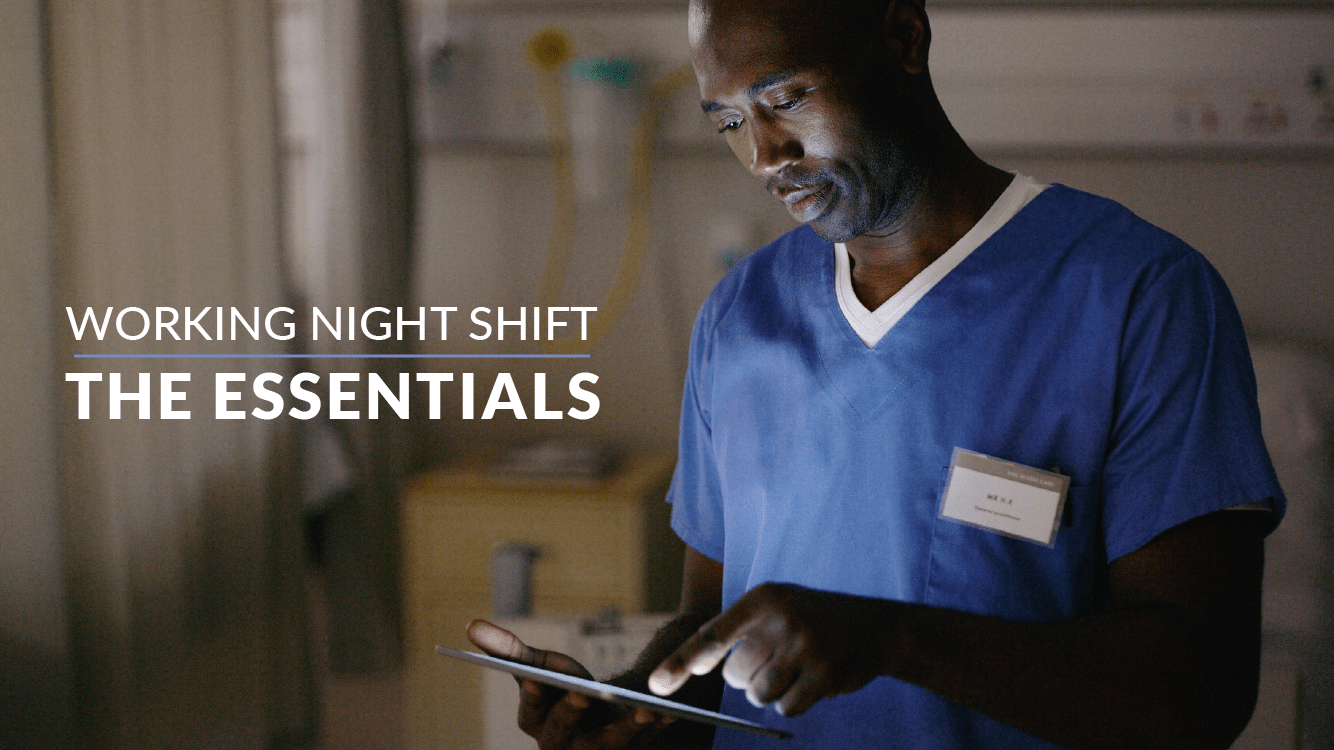
Working Night Shift: The Essentials
Although the duties and responsibilities are no different for a clinician that works after the sun is down, the night shift does present unique challenges. The workplace atmosphere and schedule related to the night shift requires a clinician to make significant adjustments to his or her daily routine and personal life.
Learning how to adapt to night shift is one of the hardest obstacles that a clinician must overcome – especially since their sleeping pattern is one that is in reverse to the majority of the population, including their family and friends. Check out these 8 beneficial tips for clinicians working the night shift!
1. Accommodate your sleep schedule
Clinicians should take measures to create an environment conducive for sleep by using curtains that darken the room, and disconnecting things that will disrupt sleep. These things include your doorbell, phones, and other electronics.
It’s important for clinicians to make sleep a priority at home. Night-shifters must teach their bodies how to properly fall asleep (and remain asleep) for long periods of time without any interruptions.
According to the National Sleep Foundation (NSF), night shift clinicians keep the same bedtime and wake time schedule (even on weekends); use eye masks and ear plugs to eliminate noise and lights from a sleep environment; as well as avoid consuming alcohol and caffeinated beverages/foods close to bedtime.
2. Regulate your caffeine
Drinking a caffeinated beverage, such as coffee, tea or cola can help maintain alertness during a night shift. Taking about 20 to 35 minutes to improve an individual’s level of alertness, caffeine is an effective method for offsetting fatigue. However, it is important not to overdo caffeinated products, as drinking too much coffee can have its own issues.
3. Make healthy meal & snack choices
The meals and snacks a clinicians chooses before and during the night shift can have a significant effect on energy, stamina, and performance levels. It is important to choose the items that provide energy but do not cause sleepiness or a ‘crash-and-burn’ effect later on in the shift.
Adopting a ‘grazing’ approach towards eating while working the night shift is also suggested, meaning you consume smaller, more frequent light meals with raw salads, nuts, fruit, and vegetables. Opt for well-balanced meals that include high-protein, complex carbohydrate, and low-fat foods.
Additional tips:
- Browse the local health food store for tasty snack options. It’s suggested to avoid eating large amounts of refined sugar (such as doughnuts, cookies, and cakes), which can deliver an instant boost of energy but can also lead to extreme mood swings and a crash later on in a shift.
- Try choosing gluten-free bread when making sandwiches.As the body ages, the more difficult it becomes to digest gluten, which can cause a blockage in the bowel. To aid a healthy bowel system that performs more efficiently and contributes to higher energy levels in nurses, attempt to avoid gluten in food prep.
4. Keep busy while on shift
Clinicians must find constructive ways to keep busy in order to survive the typically slower-paced atmosphere of the night shift. Usually only staff and patients are present during the night shift, which allows clinicians to administer excellent patient care on a more intimate level.
5. Safety after your shift
The concept of surviving the night shift doesn’t only pertain to the time spent in the workplace, but also extends to what you do after your shift ends.
To help fight the sleepiness after a night shift, many drivers will let down car windows or turn up the volume of the radio – an alarming signal that fatigue can greatly affect the safety of a driver. The NSF says that these methods of trying to stay awake and alert while driving does not work and pulling over immediately are the best thing someone can do if he or she has reached this dangerous level of fatigue and sleepiness.
Additional tips:
- Carpool with a co-worker when possible, and hold a conversation with the driver.
- When applicable, choose public transportation.
- Do not stop for drinks with co-workers as a way to unwind.
- Wear wraparound sunglasses when driving home in the morning so the body becomes less aware of the daylight.
- Embrace defensive driving techniques.
6. Stay active to stay alert
Clinicians who work the night shift tend to experience the most fatigue and drowsiness around 4 a.m. and should avoid completing the most tedious or monotonous tasks during that time.
Engaging in a bit of exercise as a way to fight back when a feeling of fatigue starts to take over during the night shift. Staying active during breaks is an effective way to reboot energy levels, and may include taking a walk to the cafeteria, climbing a set of stairs, or dancing to a song on the radio in the break room!
7. Create a bond with your fellow night-shifters
Night shift creates a completely different environment from the day shift; one that causes a clinician to become more resourceful since there is fewer managers, directors, and physicians on duty. Bonding with co-workers not only makes the night shift easier to handle but through communication between co-workers can also help increase the likelihood that a shift will run smoothly.
8. Monitor your health
Working the night shift can have a detrimental effect on a clinician, both physically and mentally if he or she does not effectively monitor their health. Night shift workers face a higher risk of experiencing insomnia, daytime sleepiness, high blood pressure, diabetes, menstrual irregularities, colds, and weight gain than day shift employees. Make sure you take care of yourself, so you can take care of your patients!
APPLY for travel nursing jobs today to get started on your travel adventure!
SOURCE: https://everynurse.org/blog/survival-tips-nurses-working-night-shift/


